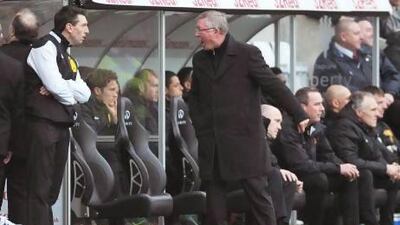Recognition comes in many forms. Whether the unveiling of his statue, outside the stand that bears his name at Manchester United's Old Trafford stadium, or the study at Harvard University into his managerial methods, the last few weeks have provided further evidence of the remarkable career of Sir Alex Ferguson.
A 70 year old whose managerial days began when Richard Nixon and Leonid Brezhnev were the world's most powerful men remains at the height of his profession when Gangnam Style is a global craze.
If the American academics concluded that Ferguson is a specialist at psychology, they would not be alone.
Over 26 years at United, Ferguson has had plenty of tactical triumphs and has made a succession of superb signings, but many of the defining moments of his reign can be traced back to his ability to get under people's skin: he can exonerate, motivate and rejuvenate his players, just as he can intimidate and irritate rivals.
Ever since Kevin Keegan, then the Newcastle United manager, was famously psyched out by Ferguson in the title race in 1996, the assumption has been that he is a master of mind games, whose every word is perfectly calibrated and calculated to have an impact on insiders or outsiders, if not both.
A contemporary provides a comparison, although they are opposites in many ways. The former England cricket captain Mike Brearley was described by the Australian fast bowler Rodney Hogg as having "a degree in people".
Yet Brearley is a Cambridge-educated psychoanalyst; Ferguson's qualifications are from that rather more brutal institution, the University of Glaswegian Life. No wonder Harvard were intrigued.
Yet what would the Ivy League make of the most astonishing outburst of the Premier League season?
After Sunday's 1-1 draw at the Liberty Stadium, Ferguson called for a lengthy suspension for the Swansea City captain Ashley Williams for what he branded the most dangerous thing he had seen on a football field for years: kicking the ball against the head of the prostrate Robin van Persie as United's top scorer lay on the floor.
Yet there are two sides to every story and Williams, who has no history of malice, said it was entirely accidental.
Saying Van Persie could have been killed was not a proportionate response but there are times when Ferguson lacks perspective.
The United manager's opinions are pronounced with the utter conviction of a man who, as his total of 48 trophies shows, is usually right.
Yet was this more dangerous than some of the tackles Roy Keane and Paul Scholes have made? More dangerous than Eric Cantona kung-fu kicking a spectator? Or, indeed, more dangerous than being sat in Ferguson's dressing room?
David Beckham sustained a cut above the eye when a furious Ferguson kicked a boot at him. To follow the Scot's logic of what could have happened, Beckham could have lost an eye then.
During his Aberdeen days, Doug Rougvie had to take evasive action to avoid another flying boot, belted by an irate Ferguson. He kicked a tea urn at his Dons defence at half time in a European game, although it did more damage to the wall than his back four.
In another instance, he took out his frustrations on a laundry basket. His players were too afraid to move, even the one who suddenly found himself sporting some underwear, booted by Ferguson, as a hat, until the manager turned on him.
"And you can take those pants off your head," he barked at the unfortunate individual. "What the hell do you think you're playing at?"
Thirty years on, it has a comic value. Yet the match that provoked that particular loss of temper was that least important of occasions: a reserve team game at Forfar.
It is little wonder that his Aberdeen players nicknamed him "Furious". Because, while Ferguson says he has mellowed and that he has to take a more diplomatic approach with the modern-day player, rage still plays its part.
He has a fear factor that is unrivalled in 21st-century football, where the dictators are a dying breed.
Ferguson can scare people into submission. He knows it, too.
"Anger keeps him going. It's like petrol to him, anger," said Gordon Strachan, who played for him at Aberdeen and United, proved too independent-minded for Ferguson's liking and is now one of the most perceptive observers of his management.
"He is the best sports psychologist in the world bar none, but the techniques he uses would not get through the Geneva Convention."
Ferguson's regular outbursts claiming that outsiders, whether officials, the authorities or the media, are, deliberately or otherwise, anti-United rarely stand up to scrutiny but they help build a siege mentality nonetheless.
Yet it is a moot point if the volcanic eruptions and extreme overreactions, such as that at Swansea, are really part of the master plan or just a feature of his make-up.
Even in his eighth decade, a will to win is so pronounced that he can struggle to accept anything other than victory.
Because this is the paradox of the great sports psychologist: he would make for a fascinating psychological study himself.
Follow us


